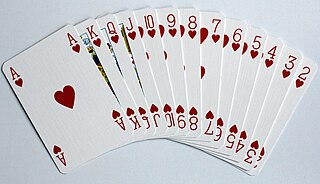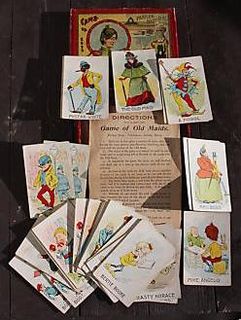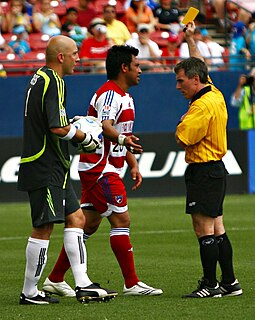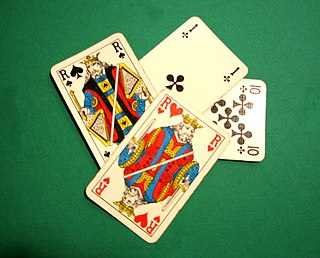This article needs additional citations for verification .(November 2021) |
Black Monday is a card game published in 1988 by Hexagames.
This article needs additional citations for verification .(November 2021) |
Black Monday is a card game published in 1988 by Hexagames.
Black Monday is a game in which each players use cards to represent shares of stock and how they can fall or rise. [1]
Brian Walker reviewed Black Monday for Games International magazine, and gave it 3 stars out of 5, and stated that "The game is fun to play and quite skillful when played with three or four; any more and it's pretty random. Not one of Sid's best, though." [1]
Paul Brady for The Guardian said "It is a simple card game, easy to pick up, but can be fast and furious when you have the knack." [2]
Barry Ellis, writing in The Game Report, noted "Practically any game by Sid Sackson is a joy to play, as it invariably has simple rules yet ample opportunities abound for serious decision making and player interaction." Regarding Black Monday, Ellis admitted, "This is not one of his best efforts, but I'm currently finding it to be entertaining, and perhaps more importantly, I have no problem getting people to play it." [3]

Hearts is an "evasion-type" trick-taking playing card game for four players, although most variations can accommodate between three and six players. It was first recorded in America in the 1880s and has many variants, some of which are also referred to as "Hearts"; especially the games of Black Lady and Black Maria. The game is a member of the Whist group of trick-taking games, but is unusual among Whist variants in that it is a trick-avoidance game; players avoid winning certain penalty cards in tricks, usually by avoiding winning tricks altogether. The original game of Hearts is still current, but has been overtaken in popularity by Black Lady in the United States and Black Maria in Great Britain.

Magic: The Gathering is a tabletop and digital collectable card game created by Richard Garfield. Released in 1993 by Wizards of the Coast, Magic was the first trading card game and had approximately thirty-five million players as of December 2018, and over twenty billion Magic cards were produced in the period from 2008 to 2016, during which time it grew in popularity.

Poker is a family of comparing card games in which players wager over which hand is best according to that specific game's rules. It is played worldwide, however in some places the rules may vary. While the earliest known form of the game was played with just 20 cards, today it is usually played with a standard deck, although in countries where short packs are common, it may be played with 32, 40 or 48 cards. Thus poker games vary in deck configuration, the number of cards in play, the number dealt face up or face down, and the number shared by all players, but all have rules that involve one or more rounds of betting.

Games of patience, or (card) solitaires as they are usually called in North America, have their own 'language' of specialised terms such as "building down", "packing", "foundations", "talon" and "tableau". Once learnt they are helpful in describing, succinctly and accurately, how the games are played. Patience games are usually for a single player, although a small number have been designed for two and, in rare cases, three or even four players. They are games of skill or chance or a combination of the two. There are three classes of patience grouped by object.

War is a simple card game, typically played by two players using a standard playing card deck — and often played by children. There are many variations, as well as related games such as the German 32-card Tod und Leben.

Black Lady is an American card game of the Hearts group for three to six players and the most popular of the group. It emerged in the early 20th century as an elaboration of Hearts and was initially also called Discard Hearts. It is named after its highest penalty card, the Queen of Spades or "Black Lady". It is a trick-avoidance game in which the aim is to avoid taking tricks containing hearts or the Black Lady. American author and leading bridge exponent, Ely Culbertson, describes it as "essentially Hearts with the addition of the queen of spades as a minus card, counting thirteen" and goes on to say that "Black Lady and its elaborations have completely overshadowed the original Hearts in popularity."

President is a shedding card game for three or more, in which the players race to get rid of all of the cards in their hands in order to become "president" in the following round. It is a Westernized version of Chinese climbing card games such as Zheng Shangyou, and the Japanese Daifugō.

Crazy Eights is a shedding-type card game for two to seven players and the best known American member of the Eights Group which also includes Pig and Spoons. The object of the game is to be the first player to discard all of their cards. The game is similar to Switch and Mau Mau.

Old Maid is a Victorian card game for two or more players probably deriving from an ancient gambling game in which the loser pays for the drinks.

Forty-fives is a trick-taking card game that originated in Ireland. The game is popular in many communities throughout Atlantic Canada as well as the Gaspé Coast in Québec. Forty-fives is also played in parts of Massachusetts and southern New Hampshire in New England, United States, as well as in the South Island of New Zealand.
Lunch Money is an elimination-style card game designed by C.E. Wiedman and released in 1996 by Atlas Games.

Snip-Snap-Snorum, or Snip-Snap-Snorem, is a matching-type card game, mostly played by children, and has several variants. The game dates to at least the 18th century, and probably derives from a more ancient drinking and gambling game. References to "Snip, snap, snorum", which seems to be the original spelling, go back to at least 1755.

Empire Builder is a railroad board game originally published by Mayfair Games in 1982 that underwent several editions and eventually branched out into international and fantastical locations.

Penalty cards are used in many sports as a means of warning, reprimanding or penalising a player, coach or team official. Penalty cards are most commonly used by referees or umpires to indicate that a player has committed an offence. The official will hold the card above their head while looking or pointing towards the player that has committed the offence. This action makes the decision clear to all players, as well as spectators and other officials in a manner that is language-neutral. The colour or shape of the card used by the official indicates the type or seriousness of the offence and the level of punishment that is to be applied. Yellow and red cards are the most common, typically indicating, respectively, cautions and dismissals.

Twenty-eight is an Indian trick-taking card game for four players, in which the Jack and the nine are the highest cards in every suit, followed by ace and ten. It thought to be descended from the game 304, along with similar Indian games known as "29", "40" and "56".
Enemy in Sight is a card game for 2–8 players published by Avalon Hill in 1988 that simulates naval warfare in the Age of Sail.

RoboRally is a board game for 2–8 players designed by Richard Garfield and published by Wizards of the Coast (WotC) in 1994. Various expansions and revisions have been published by both WotC and by Avalon Hill.
Bowling Solitaire is a patience or solitaire card game that uses a single deck standard playing cards to simulate a round of ten-pin bowling.

Slay the Spire is a roguelike deck-building video game developed by American studio MegaCrit and published by Humble Bundle. The game was first released in early access for Microsoft Windows, macOS, and Linux in late 2017, with an official release in January 2019. It was released for PlayStation 4 in May 2019, for Nintendo Switch in June 2019 and for Xbox One in August 2019. An iOS version was released in June 2020, with an Android version released in February 2021.

What the Heck? is the North American title of a card game originally designed and published in Germany in 1988 by Ravensburger under the title Hol's der Geier. The game has subsequently been marketed in a number of countries under various titles.